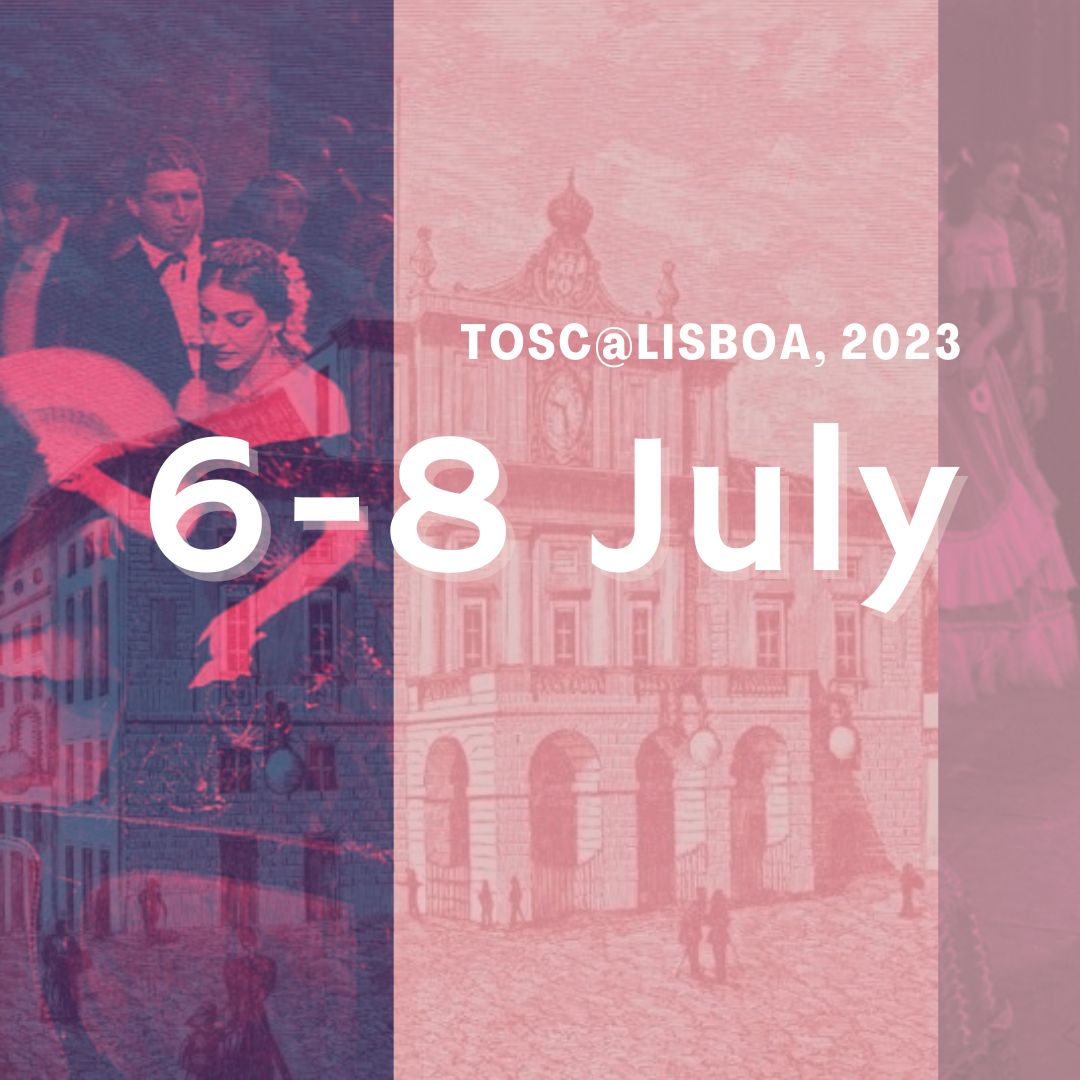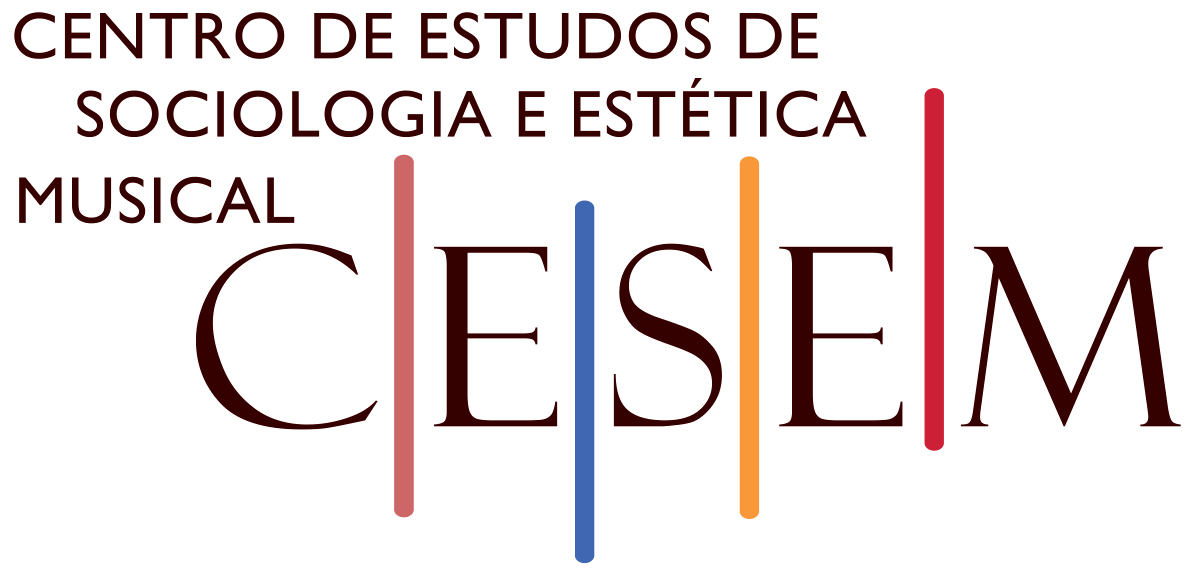
- This event has passed.
TOSC@Lisboa – 5th Transnational Opera Studies Conference
06/07/2023 - 08/07/2023

5th Transnational Opera Studies Conference
TOSC@Lisboa
July 6-8, 2023
Universidade Nova de Lisboa
Thursday, July 6
Colégio Almada Negreiros
13:30 – 14:00: Welcome & Registration
14:00 – 14:30: Opening Session (with Luísa Cymbron, Jelena Novak and João Pedro Cachopo)
14:30 – 15:30: Keynote address
- Rogerio Budasz (University of California, USA), Opera and Abolitionism in Nineteenth-Century Brazil
15:30 – 16:00: Coffee break
16:00 – 18:00: Panels I, II & III
Panel I: The Futures of Wagner
- Carolyn Abbate (Harvard University, USA), Wagnerian Biochemistries
- Anno Karl Maria Mungen (University of Bayreuth, Germany), Hitler’s Bust of Richard Wagner: Arno Breker, War, and Genocide
- Oliver Puckey (Cambridge University, UK), Richard Wagner, London And The “Artwork Of The Future”, 1855
- Mauro Fosco Bertola (Universitä Tübingen, Germany), Trauma and Dreams in Kaija Saariaho’s and Amin Maalouf’s Adriana Mater
Panel II: Beyond Coloniality
- Katharina N. Piechocki (University of British Columbia, Canada), The Colonial Libretto: Global Poetics and Multilingualism in Early Seventeenth-Century Roman Opera
- Francesco Milella (Cambridge University, UK), Paisiello’s Barbiere: an Italian zarzuela in colonial Mexico
- John Gabriel (University of Melbourne, Australia), Columbus, Catholicism, and Colonialism in Central European Opera circa 1930
- Joshua Tolulope David (University of Toronto, Canada), Beyond (Re)presentation: An Analysis of Opera Productions in Lagos, Nigeria
Panel III: Performing Gender and Politics
- Barbara Gentili (Cardiff University, UK), Between Reception and Production: the Transnational Representation of the Singing and Acting New Woman
- Asli Kaymak (University of Bristol, UK), Guillaume Tell in London: Hofer’s Female Army
- Molly C. Doran (Wartburg College, USA), Staging Women’s Trauma on the Twenty-First Century Operatic Stage: Exploitation vs. Ethical Engagement
- Harriet Boyd-Bennett (University Park, USA), Opera, Workers, and Song: Towards a Turin Cantology
Friday, July 7
Colégio Almada Negreiros
9:00 – 11:00: Panels IV, V & VI
Panel IV: Between Stage and Screen
- Giuliano Danieli (La Sapienza University of Rome, Italy), Carmine Gallone’s Casta Divaand the Italian Composer Biopic, 1935-1954: Pastiche, History and Affect
- Kunio Hara (University of South Carolina, USA), Madama Butterfly Across Time and Space: Yōko Kanno’s Soundtrack to Magnetic Rose (1995)
- Daniele Peraro (La Sapienza University of Rome, Italy) “Immediate” and “Direct” Performances? Live Singing on Set in Damiano Michieletto’s film Gianni Schicchi(2021)
- Mara Lane (University of California, USA), Opera Caught on Camera
Panel V: Across the Atlantic
- Charlotte Bentley (Newcastle University, UK), 1898 on The Musical Stage: The Spanish-American War in Transnational Perspective
- Joana de Almeida Peliz (Universidade Nova de Lisboa, Portugal), A “true féerie”: Antunes/Machado’s Venusand Some Transnational Dimensions of Luso-Brazilian Musical Theatre in the Long 19th Century
- David Cranmer (Universidade Nova de Lisboa, Portugal), Portuguese Opera and Metastasio Adaptations in Portugal and Brazil: Paradigms, Sources and Performance Options
Panel VI: Staging Race and Violence
- Helena Kopchick Spencer (University of North Carolina Wilmington, USA) Sexual and Racial Violence in Henri Justamant’s Ballet Divertissements for Les Huguenotsand Robert le Diable
- Siel Agugliaro (Università di Pisa, Italy), “Trionfo dell’Arte Italiana”? The U.S. Premiere of Cavalleria RusticanaBetween Racial Anxieties and Ethnic Pride
- Christine Fischer (Ludwig-Maximilians-Universität Munich, Germany) The Cabildo: Hybridization and National Identities in Amy Beach’s Chamber Opera
- Allison Chu (Yale University, USA), Staging Documentary Ambiguity: The Racialized Subjects of Operatic Trial Scenes
11:00 – 11:30: Coffee break
11:30 – 13:00: Themed Session I & Roundtables I & II
Themed Session I: Social, Political and Aesthetic Determinants of Opera Theatre in Conquered European Countries: the Case of Poland and Stanisław Moniuszko’s Operas
- Małgoszata Sokalska (Jagiellonian University, Poland), Aspirations and Expectations. Moniuszko’s Concept of Opera in a Network of Intertextual References
- Ryszard Daniel Golianek (Adam Mickiewicz University, Poland), The Musical Style of Moniuszko’s Operas as a Compromise between European Trends and Local Tastes
- Ziemowit Wojtczak (Grazyna and Kiejstut Bacewicz University of Music, Poland), Moniuszko’s Musical Idiom as an Obstacle to the Reception of his Operas by Western Audiences
Roundtable I: Opera in the Digital World: Activism, Popular Culture and Design
- Jane Forner (University of Toronto, Canada)
- Aurore Aubouin (Philharmonie de Paris, France)
- Barbara Babic (Universität Leipzig, Germany)
- Simon Hatab (Dramaturg, Paris)
- Sofija Perovic (Faculty of Contemporary Arts, Belgrade)
- Tijana Trailovic (Scenographer, Serbia)
Roundtable II: European Opera as Informal Empire: Perspectives on Latin America
Moderation: Paulo Kühl (Universidade Estadual de Campinas, Brazil)
- José Manuel Izquierdo (Pontificia Universidad Católica de Chile)
- Megan Estela (Université Paris 8, France)
- Charlotte Bentley (Newcastle University, UK)
- Alessandra Jones (Indiana University, USA)
13:00 – 14:30: Lunch break
13:00 – 14:30: Panels VII, VIII & IX
Panel VII: Identity and Politics in Italy
- Cormac Newark (Guildhall School of Music & Drama, UK), Identity Politics and Opera in Italy: Torrefranca and d’Amico
- Jean-François Lattarico (Université Lyon 3, France), L’amante democratico: Opéra jacobin et identité nationale en Italie (1792-1799)
- Zoey M. Cochran (Université de Montréal/McGill University, Canada), The Political Origins of the commedeja pe’ museca(1706–1707)
- Taryn Dubois (Yale University, USA) A Modern Amor: Nationalism and Musical Embodiment in Italian Theatrical Dance
Panel VIII: Body, Voice, Memory
- Sarah Fuchs (Royal College of Music, UK), Emma Calvé’s Digital Afterlife
- Natalija Stankovic & Stefan Savic (University of Arts & Institute of Musicology SASA, Serbia), How Much Body is There in the Voice? The Comparative Analysis of Maria Callas’s and Sondra Radvanovsky’s Portrayals of Luigi Cherubini’s Medea
- Jingyi Zhang (Harvard University, USA), Parallel Worldbuilding in Indie Opera: The Industry’s Sweet Land(2020)
- Colleen Renihan (Queen’s University, Canada), Embodiment as Memory in Contemporary Canadian Opera
Panel IX: Queering Opera
- Jessica Gabriel Peritz (Yale University, USA), The Queer Musical Temporality of Vernon Lee
- Christina Colanduoni (University of Chicago, USA), Blindness and Violence: The Disabling Effects of Operatic Conventions
- Devon J. Borowski (University of Chicago, USA), Only her Wigmaker Knows for Sure, or Is the Castrato Camp?
- Jessica Sipe (Yale University, USA) “Three Brides, Tender and Pure”: Deviant Sexuality in Heinrich Marschner’s Der Vampyr
16:30 – 17:00: Coffee break
17:00 – 18:00: Tosc@ Award Winner’s Address
- Parkorn Wangpaiboonkit (Washington University in St. Louis, USA), The Idea of Opera in Siam: From Civilizational Emblem to the Invention of the Thai Race
Saturday, July 8
Colégio Almada Negreiros
9:00 – 11:00: Panels X, XI & XII
Panel X: Form and Affect
- Heather Wiebe (University of Notre Dame, USA), Opera’s Affective Spaces in the 1950s: Billy Budd and Dialogues des Carmélites
- Zachary Lee Nazar Stewart (Yale University, USA), What happened to Mère Marie?
- Arman Schwartz (University of Notre Dame, USA), The Modernist Short Opera
- Chikako Kitagawa (Keio-University Tokyo, Japan), Horizon Opening or Problem Field? Realisations of the Noh Theatre in Operas by Kaija Saariaho and Toshio Hosokawa
Panel XI: Experiments and Mediations
- Emanuele Senici (La Sapienza University of Rome, Italy), “The Whole Theatre as the Set, All of It”: Screening the Rome Opera During the Pandemic
- Mauro Calcagno (University of Pennsylvania, USA), Performance, Heterochrony, Historiography: The Wooster Group’s 2007 Production of Busenello-Cavalli’s La Didone(1641) and Baroque Opera Representation
- Johanna Danhauser (University of Bayreuth, Germany), Island Kinships: A Spectacle Analysis of Archipelby Fujimoto/Thiersch/Muntendorf based on Donna Haraway
- Jasmin Goll (University of Bern, Switzerland), Mediating Opera and Technology. Operatic Transmissions by Telephone in Late Nineteenth-Century Berlin
Panel XII: Issues of Text and Performance
- Inori Hayashi (Ochanomizu University, Japan), Minor Changes in the Autograph Score of the Revised Simon Boccanegra by G. Verdi: Melodies Toward Natural Speaking Tone
- Sarah Hibberd (University of Bristol, UK), The Dynamics of the Puritani Quartet: Tamburini in the Limelight (1836)
- Karina Zybina (Paris Lodron University of Salzburg, Austria), The Wonderful Adventures of the Cairo Goose: W.A. Mozart’s Opera Fragment in Paris and Berlin (1867)
- Guido Olivieri (University of Texas at Austin, USA), Su alcuni “segreti” de Il matrimonio segretodi Domenico Cimarosa
11:00 – 11:30: Coffee break
11:30 – 13:00: Themed Sessions II, III & IV
Themed Session II: Listening Through Callas: Mediations and Metamorphoses
Respondent: Ginger Dellenbaugh (Yale University, USA)
- Emilio Sala (Università degli Studi di Milano, Italy), Lip-syncing to Callas
- Michal Grover-Friedlander (Tel-Aviv University, Israel), Callas’s Voice-overs
- Martha Feldman (University of Chicago, USA), Tough Magic: Callas’s Rebetiko, Greek Suffering, and the Unsentimental
Themed Session III: Nineteenth-Century Italian Opera Far From Europe
- Céline Frigau Manning (Université Lyon 3, France), “Sick of the Old World’s Sophistry!”: Performing Italian Opera at Sea in 1825
- Maeva Meyer (Université Lyon 3, France), Verdi’s Aida From the Perspective of the Egyptian Nahda
- Megan Estela (Université Paris 8, France), “The Goddess From Beyond the Seas:” Challenging the Reception of Patti’s Four Tours in America (1886-1890)
Themed Session IV: Opera, Its Audiences and Recipients Between 17th and 18th Century
- Vera Grund (Musikwissenschaftliches Seminar Detmold/Paderborn, Germany), “From the shores of the Tevere to those of the Adriatic”: Venetian Opera as Euergetism and mass culture
- Carlo Bosi (Universität Salzburg, Austria), Early Venetian Opera beyond the Lagoon: Reception and Censorship
- Carlo Bosi & Vera Grund, Arias, music and their recipients
13:00 – 14:30: Lunch break
13:00 – 14:30: Panels XIII, XIV & XV
Panel XIII: The Case of Callas
- Shadi Seifouri (Cambridge University, UK), “Je Veux Vivre!”: Operatic Holograms, Maria Callas, and The Limits of Liveness
- Lea Luka Tiziana Sikau (Cambridge University, UK), The Artist is Present, la Callas is Absent: (No) Rehearsing with Posthumous Divas
- Jane Sylvester (University of Missouri-Kansas City, USA), Callas on the Catwalk: Operatic Revival in the House of Valentino
- Marie-Anne Kohl (University of Bayreuth, Germany), Die Vokalperformance von Maria Callas als Geschlechterperformanz, dargestellt an ihrer Tosca-Interpretation
Panel XIV: The Nation and the Empire
- Claudio Vellutini (University of British Columbia, Canada), Opera, Mobility, and Austrian Cultural Policies after the Congress of Vienna
- Luka Nakhutsrishvili (Ilia State University, Georgia), The Theatre-Caravanserai of Tbilisi and Imperial Dreams of Infrastructure in the Russian Caucasus, 1845-1874
- Liisamaija Hautsalo (University of the Arts Helsinki, Finland), Vernacularization and the Finnish Opera Boom
- Tanya Sirotina (The University of Winchester, UK), “The Lucky Miller”: Two Centuries of Historical Collisions Between Three Unique Operas
Panel XV: Challenging the Stage
- Collin Ziegler (University of California, UK), Opera and Trees
- Helena Langewitz (Johannes Gutenberg University Mainz, Germany), Migrations of the Garden as a “Schau-Ort” for the Opera in 18th Century. Stage Design Motifs and the Idea of the Garden Venue in Motion
- Francesca Vella (Northumbria University, UK), Artisans of the Theatre: Set Design in 1930s Florence
- Anne Le Berre (École Normale Supérieure de Lyon, France), Le Festival international d’art lyrique d’Aix-en-Provence: penser une Méditerranée lyrique au XXIe siècle
16:30 – 17:00: Coffee break
17:00 – 18:00: Keynote address
- Tereza Havelkova (Charles University, Czech Republic), Opera and (Post-)Colonialism: A View from East-Central Europe
More info here
